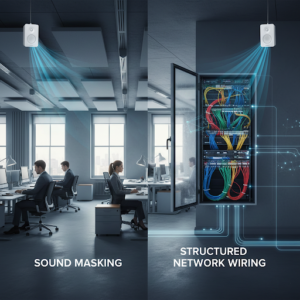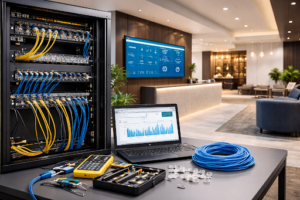Understanding Security Camera Options
When it comes to securing your home or business, choosing between wired and wireless security cameras is a crucial decision. Both options offer unique advantages depending on your needs, property size, and technical preferences.
Wired security cameras are known for their reliability and consistent connection, and wireless security cameras provide flexibility and ease of installation. To make an informed decision, it’s essential to weigh the benefits and limitations of each system.
The Advantages of Wired Security Cameras
Wired security cameras are a traditional choice that many homeowners and business owners trust. These cameras connect directly to a recording device or monitor via cables, ensuring a stable and uninterrupted video feed.
Some key advantages include:
- Consistent and Reliable Connection – Unlike wireless security cameras, wired security cameras do not rely on Wi-Fi, reducing the risk of signal interference or disconnection.
- Higher Video Quality – Since they use direct cabling, wired security cameras often deliver higher-resolution footage without lag or buffering.
- Ideal for Large Properties – Businesses, warehouses, or large homes benefit from the extensive coverage and scalability of wired security cameras.
- More Secure from Hacking – Because they are not connected to the internet, wired security cameras are less vulnerable to hacking attempts and cyber threats.
Note: Wired security cameras require professional installation, which may involve drilling holes for cables and configuring complex wiring systems. This can make them less convenient for renters or those looking for a quick setup.
Why Choose Wireless Security Cameras?
Wireless security cameras on the other hand have gained popularity due to their flexibility and ease of installation. These cameras connect to a Wi-Fi network, allowing users to monitor footage remotely through smartphones or computers.
Some key benefits include:
- Easy Installation – Unlike wired security cameras, wireless security cameras do not require extensive cabling, making them perfect for renters or homeowners who want a hassle-free setup.
- Remote Access and Smart Features – Many wireless security cameras come equipped with mobile app integration, enabling real-time monitoring from anywhere in the world.
- Scalability and Flexibility – Since they do not rely on complex wiring, wireless security cameras can be easily repositioned or expanded as needed.
- Ideal for Small Spaces – Apartments and small homes benefit from wireless security cameras as they require minimal installation effort and provide effective coverage.
Note: Despite these advantages, wireless security cameras depend on a stable Wi-Fi network, and their functionality can be affected by internet outages or bandwidth limitations. They also require regular battery changes or recharging, unlike their wired counterparts.
Comparing Performance and Reliability
When evaluating wired security cameras versus wireless security cameras, performance and reliability play a significant role. Wired surveillance cameras Dallas excel in environments that require continuous surveillance without interruptions, such as banks, retail stores, and large residential properties. Meanwhile, wireless security cameras are best suited for individuals who need a quick-to-install solution with remote access and smart features.
Factors to consider when choosing between the two include:
- Power Source – Wired security cameras are connected to a power source, while wireless security cameras may require battery replacements or solar-powered options.
- Weather Resistance – If you plan to install outdoor cameras, consider whether your chosen model is designed to withstand harsh weather conditions.
- Long-Term Costs – Wireless security cameras may have lower installation costs, but wired security cameras offer durability and longevity with fewer maintenance requirements.
The Role of Security Cameras in Modern Surveillance
Regardless of whether you opt for wired security cameras or wireless security cameras, both options contribute significantly to modern surveillance. Studies show that properties equipped with visible security cameras experience a 50% reduction in crime rates, emphasizing their importance in deterring potential intruders.
Dallas surveillance cameras have become an essential security tool for homeowners and businesses alike. Property owners must carefully select the best option that suits their security needs due to the growing demand for CCTV surveillance cameras. The choice between wired security cameras and wireless security cameras ultimately depends on personal preferences, property layout, and security priorities.
Integrating Security Cameras with Access Control Systems
Integrating security camera installation with access control systems offers a comprehensive solution and enhanced security. Businesses and homeowners in North Texas can combine security camera Dallas solutions with smart locks, keycard entry, or biometric authentication. This integration allows for real-time monitoring and restricted access to sensitive areas, ensuring only authorized personnel can enter.
Making the Right Choice
Choosing between wired security cameras and wireless security cameras depends on your specific needs. If you prioritize reliability, uninterrupted recording, and long-term performance, wired security cameras are an excellent investment. However, if flexibility, easy installation, and remote monitoring are your top concerns, wireless security cameras might be the better option.
Consulting with a security camera installation expert in Dallas can help tailor a security system that meets your requirements. You can ensure the safety of your loved ones, employees, and valuable assets with the right security cameras in place.





